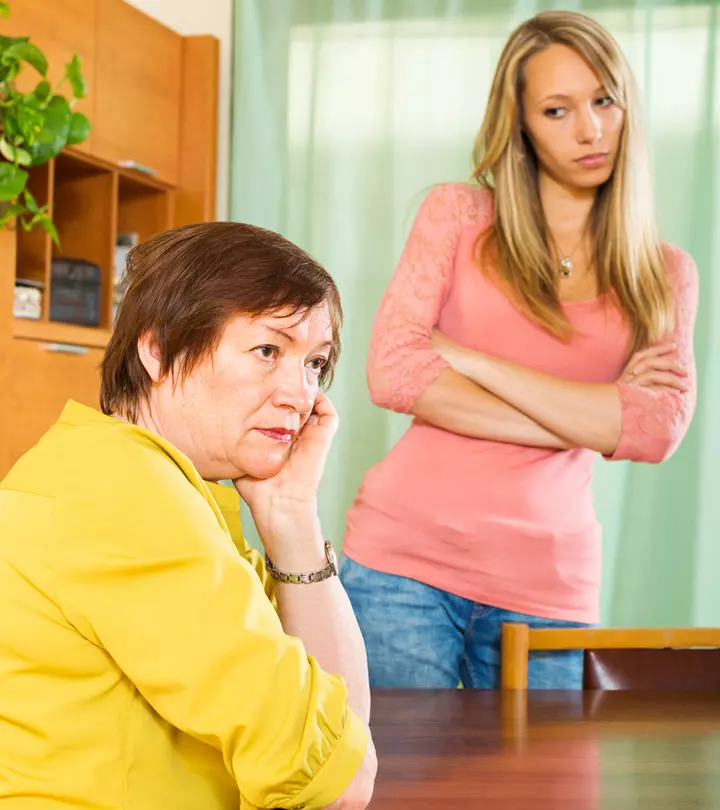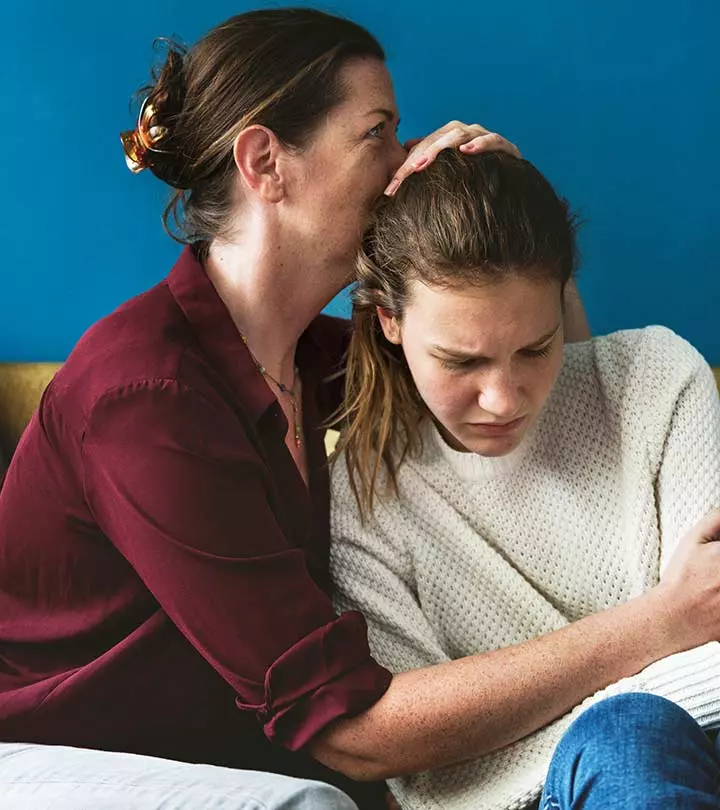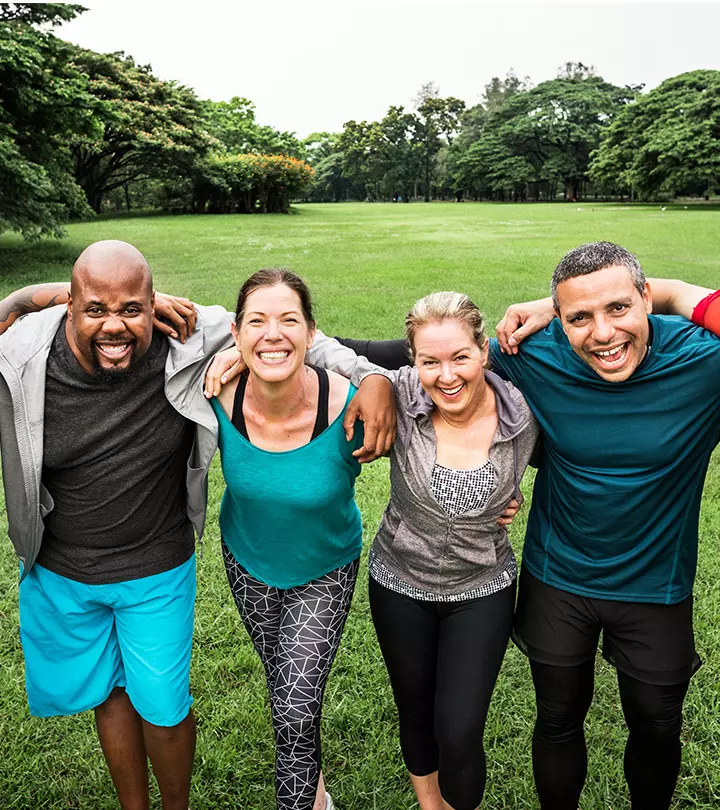7 Signs Of Socially Awkward People And Solutions
Learn about the signs of social awkwardness and how it is different from social anxiety.

Image: Shutterstock
Many of us feel socially awkward and timid in public. That constant feeling of anxiety, nervousness, and fumbling to say the right words or crack the right jokes at the right time – it takes a lot to interact with people in a social environment. But, instead of self-doubting yourself in a social gathering, it’s best to do a little homework and practice. After all, there is nothing in this world that you cannot learn!

Being socially awkward may seem like a personality trait. However, you can overcome it if you have the will and patience to let go and open yourself up to learning. This shift is not going to happen overnight. You need courage, motivation, and positive thoughts to face your fears. After all, you have nothing to lose, do you? Read on to learn the 7 signs that you are socially awkward and how to overcome it. Scroll down!
In This Article
Understanding Social Awkwardness
Social awkwardness occurs when a person struggles to deal with social interactions smoothly. Socially awkward people often exhibit discomfort or anxiousness in social settings and are known to get entangled in miscommunication. Although sometimes, people may behave awkwardly in social situations due to simply being distracted or preoccupied with other things, frequently demonstrating such symptoms may hint at underlying Psychological issues. They may have social anxiety disorder, wherein they experience fear or anxiety at the mere thought of being a part of social situations where they are exposed to the scrutiny of other people (1). Some believe that cognitive biases, such as overanalyzing one’s actions or fearing negative judgment, can also contribute to increasing self-consciousness in social settings, leading to awkwardness. This makes it difficult for them to interpret social cues, maintain conversations, or express themselves confidently.
From a social perspective, cultural norms, upbringing, or limited exposure to diverse social environments can shape how comfortably a person interacts with others (2). For instance, those who grow up in highly structured or isolated environments may find spontaneous social interactions challenging. Additionally, neurodivergent people, such as those with autism spectrum disorder (ASD), may experience social awkwardness due to differences in processing social cues and nonverbal communication (3). While occasional awkwardness is normal, persistent difficulties can affect personal and professional relationships.
The famous researcher Joshua Clegg describes social awkwardness as a feeling where people believe that their desire for being accepted by other people is a bleak possibility. This causes them to turn inwards and also really increases their self-monitoring. They attempt to behave in more socially acceptable ways, which will increase their chances of getting accepted.
Key Takeaways
- Social awkwardness occurs when someone believes they will unlikely be liked or accepted by others or that they will say the wrong thing and appear stupid and feel humiliated.
- They may feel anxious around others or have difficulty understanding nonverbal cues.
- The discomfort of social awkwardness is real, but once you recognize the signs and learn how to handle them, they can be overcome.
Signs Of Socially Awkward People And Solutions
1) Get Anxious Easily Around Other People

People who are dealing with social awkwardness due to social anxiety disorder often have fear of social situations in their minds (1). This fear can stem from the anxiety of saying anything wrong or the fear of failing while interacting with others. It is this apprehensive feeling where you are constantly having a hunch that something is not working for you. You tend to be more self-conscious and insecure of yourself and your surroundings.
Imagine walking into a room full of people, your palms slightly sweaty as you rehearse what to say in your head. You start to speak, but halfway through, you second-guess your words, convinced they sound strange. A brief silence follows, and your mind races – was that awkward? Did they notice? The urge to retreat grows stronger, not because anything went wrong, but because the fear of misstepping makes every interaction feel like a test you might fail.
Paulina, a blogger, shared her experience as a socially awkward person. She used to get anxious when riding in the same elevator with strangers. She constantly planned what she had to say but failed to speak it as planned. “I am constantly planning what I am going to say before speaking, but it never comes out the way I plan (i).”
The solution is to motivate yourself to talk about it. Whenever you feel a moment of apprehension that things happening around you are not right, you can train yourself to take action at the right time. Socially inept individuals may experience social awkwardness as an early warning system. For instance, you may feel really awkward when somebody cracks an insulting joke, or you don’t know how to respond to a certain emotion trigger. However, in such situations, take a deep breath or simply go have a drink to distract yourself and take your mind off the issue.
2) Skipping Out On Non-Verbal Social Cues
Many times, socially awkward people do not understand what the other person is feeling towards them. They often miss out on cues that show that someone does not want to talk to them anymore. This one-sided effort can sometimes make your social encounters awkward and leave you (and the other person, at times) feeling embarrassed.
For example, say a conversation drags on, and the other person starts glancing at their phone. Their feet shift slightly away, and they nod absentmindedly, offering only short responses. Ignoring these signals, the conversation continues, becoming more one-sided. Eventually, they excuse themselves with a polite but hurried smile. The realization hits later, maybe they were not as engaged as they seemed. Understanding these subtle signs could have made it easier to exit the interaction smoothly and avoid lingering discomfort.
To help manage social awkwardness better, these are the signs to look for:
- Their feet are not pointing towards you and in some other direction.
- The head or the torso is facing another direction.
- They get involved in another activity during an interaction.
- Do not make eye contact regularly.
- They are constantly fidgeting while talking to you.
- They move further away from the person.
If you feel that these nonverbal cues are becoming a lot more frequent, ensure that you end the conversation on a good note. You can start wrapping up the conversation. Say things like, “Oh, did you have to get somewhere?” To make it more friendly, you can also say things like, “*name*, it was great to meet you, let’s catch up soon again.”
This is one of the oldest tricks in your guide for how to not be socially awkward. While these are non-verbal cues, let’s take a look at verbal cues that give you an idea about somebody wanting to wrap up a conversation:
- They change the topic often.
- They do not generally keep on asking questions.
- Speak only in concise phrases like “Um-hmm” or “Yes” and “No.”
You would not be socially awkward anymore if you catch on to these clues. Follow the same method. Wrap up what you are speaking and simply ask the concerned person another question.
3) Going Overboard With Talking Or Talking Too Less

Any balanced conversation has a proper balance and flow of talking and listening, giving and taking. When it comes to social awkwardness, you would often find yourself talking too much or talking too less. At certain times you may feel withdrawn and hesitant in making conversation, whereas at other times you could be chatting non-stop.
Let us take this for example – you are sitting with a group of people and the conversation shifts to weekend plans. One person excitedly shares a long-winded story about their entire itinerary, barely pausing for breath. Others nod politely but do not engage much.
Later, when the topic changes, another person stays completely silent, unsure of when or how to jump in. Both extremes create an imbalance. One side feels unheard, while the other struggles to connect.
One of the key symptoms to gauge when you ask, “Am I socially awkward?” is to figure out if you feel that you end up saying a lot more than what you are getting in response.
If this is your conversational issue, try to pause the rate of your conversation speed. Make it to four sentences and then take a break to let the other person revert. However, in some situations, socially awkward people also end up speaking less. This happens in socially awkward situations where they do not know how to respond. They don’t know whether they should speak.
In case this happens with you, go for small talk. Small talk is basically the art when you keep talking, but there is no concrete topic involved. You can simply speak about topics like somebody’s outfit, recent films they watched, the changing weather, or any topic that is not emotionally consuming. Topics that keep the other person away from negative emotions is your key to battling socially inept conversations.
 Quick Tip
Quick Tip4) Often Talk About Touchy Subjects Or Really Awkward Topics
Avoid sensitive topics such as sex, religion, or politics. Socially awkward people often may end up missing out on gauging the sensitivity of these topics and find it but natural to start them or sometimes make them cringe entirely.
Take this for example – at a casual lunch gathering, the conversation flows easily. From weekend plans to favorite restaurants. Then, someone suddenly brings up a highly controversial news topic, diving into strong opinions without realizing how tense the atmosphere becomes. A few people shift uncomfortably, others avoid eye contact, and the once-lighthearted discussion stalls. Had they picked a more neutral subject, the conversation could have remained engaging instead of turning awkward and uneasy.
One of the most significant ways to battle social awkwardness is by ensuring that you keep such passionate topics aside. It is best to avoid them rather than getting feelings of anger in the picture. Especially if one person’s point of view does not match the other person’s, it can result in really awkward conversations.
However, if you see somebody speaking about such topics, ensure that you make a disclaimer with, “We may just be getting into a susceptible area, but if you want to discuss my perspective, then I am more than happy to share it with you.”
5) Rarely Filter Out Their Feelings And End Up Being Too Honest

It is a common misconception that being socially graceful requires one to master a small form of lying. It can even mean withholding yourself from completely expressing what you really feel about a person. These lies are generally known as white lies.
Say, during a casual gathering, someone excitedly shows off a new haircut, seeking validation. Instead of offering a polite or neutral response, another person bluntly says, “It doesn’t really suit you.” An awkward silence follows as the excitement fades. While honesty is valuable, filtering words to avoid unnecessary discomfort can make social interactions smoother and more considerate.
Basically, you cannot tell a person that you do not like the outfit that they are wearing. When it comes to social awkwardness, these rules are not really well known. In a nutshell, if you interrupt and insult others, it is not considered polite. We are not saying that you practice flattery. But it is best to avoid such kinds of behavior to stop being socially awkward.
6) They Are Hardly Able To Detect Expressions Or What Others Are Feeling
For socially awkward people, one of the most significant issues is that your friends also may not be able to understand you completely. They may feel that you are not able to express the right amount of empathy or are inconsiderate towards their feelings. When people describe a life-changing loss, most socially inept people are not able to express what they are exactly feeling.
Say, during a conversation, someone shares that they have been feeling overwhelmed and stressed lately. Instead of acknowledging their emotions, the response is a factual statement like, “Well, stress happens to everyone” or “You will be fine.” The person sharing their feelings pauses, unsure how to continue, while the conversation becomes noticeably tense. A simple, “That sounds tough, do you want to talk about it?” could have made the exchange feel more supportive and less dismissive.
It is assumed that most human beings are naturally social creatures. Their ability to interact gauges their place in society. However, effortless communication is not everybody’s forte. For some people, social awkwardness may happen in bouts, but if it’s consistent, you need to reconsider your social personality and find ways to avoid this issue.
Also, you might consider becoming more emotionally fluent. Keep a feelings journal and expand your ability to identify your feelings. Many people are limited, and when you expand your feelings (there are hundreds of gradations), you will find it easier to manage them as opposed to avoiding them.
7) They Are Often Misconstrued As Introverts

One of the most significant symptoms of social awkwardness is the behavior being misconstrued for being introverted and reticent. Carl Jung has described extraversion and introversion as opposite psychological approaches, which describe how people gather energy and focus it. An extrovert would often look at the outside world, while introverts would start reflecting their thoughts inside.
However, these two things are not the same. Introverted individuals may be considered as reflective and reserved too. They gain energy from interacting with themselves and introspecting what they need to do. They would prefer to know a handful of people instead of interacting with others, and they are completely okay with being alone.
For example, at a social event, someone lingers near the edges of the room, hesitating before joining a conversation. Others assume they are simply introverted and prefer solitude, but in reality, they struggle with finding the right moment to speak or worry about saying the wrong thing. Unlike an introvert who enjoys quiet reflection, having a relaxed demeanor in their solitude, a socially awkward person appears tense and their silence stems from uncertainty rather than preference.
Now that we are aware of the top seven signs of social awkwardness, we can help you understand it better if you grasp the intricacies of the concept. Here is what being socially awkward entails.
 Trivia
TriviaSymptoms Of Being Socially Awkward
Researchers suggest that people who are continually socially awkward showcase specific symptoms. These symptoms can be described as:
- They fail to resonate with superficial societal conventions.
- They cannot get through day to day social situations.
- They have a really good focus, especially on topics that have rules in them. These topics can be related to mathematics and logic.
- They will display signs for tearing things apart, observing the intricacies, and then again reassembling these parts in different ways
- They are much less intuitive when they need to express social graces.
One might think that challenging social situations in a physical setting may trigger social awkwardness. Anything from unpleasant childhood experiences to psychological personality traits can cause social anxiety, thus leading to socially awkward behaviors (4). However, you may be surprised to learn how one can develop social awkwardness through their phone screens while sitting comfortably at home. Let us uncover how social media can influence social awkwardness.
The Impact Of Social Media On Social Awkwardness

Social media has become an integral part of modern life. It offers platforms for communication, self-expression, and connection. However, as much as it enhances virtual interaction, its impact on real-life social skills has become a topic of growing concern. Read on to know more about it.
- Virtual Vs. Real-Life Communication
One of the key distinctions between social media and face-to-face communication is the lack of non-verbal cues online. In real life, we rely on body language, tone of voice, and facial expressions to interpret messages and respond to them. However, social media interactions are mostly textual or visual, limiting these critical elements. As a result, frequent social media users may struggle with reading these cues in the real-world.
- Avoidance Of Real-Life Interactions
Another issue is the ease with which social media enables avoidance of real-life social interactions. Instead of facing potentially awkward situations, people may retreat into their online worlds. Over time, this avoidance can reinforce social anxiety and awkwardness.
- Curated Lives And Social Pressure
People often present idealized versions of their lives on social media platforms, showcasing their best moments while omitting imperfections. This causes people to feel insecure about their own social abilities or experiences.
But the good news is, there are some positive aspects to it too.
- Building Confidence
Social media can also have a positive impact by helping people build confidence in social interactions. For those who are naturally introverted or socially anxious, some online platforms offer opportunities to engage in discussions at their own pace.
- Balancing Online And Offline Socialization
The key to mitigating social awkwardness while using social media is finding a balance between online and offline interactions. Engaging in face-to-face conversations and participating in real-life social activities are essential for developing and maintaining strong social skills.
Social media is a double-edged sword when it comes to social awkwardness. On one hand, it offers a platform for connection and communication that can help build confidence in certain individuals. On the other hand, it can exacerbate social anxiety. The key is to strike a balance to build healthier and more fulfilling social lives.
That said, are social awkwardness and social anxiety the same? Let’s find out!
Social Awkwardness Vs. Social Anxiety

While social awkwardness can be best described as an alternative to living in this world, societal anxiety is more of a medical condition that leads to social impairment. If somebody has a social anxiety disorder, they are typically experiencing intense emotional stress in situations where they need to interact socially (5). Their biggest fears include the following:
- When they are introduced to other people.
- When they are criticized or teased.
- When they become the center of attention.
- If they are watched while undertaking some endeavor.
- Meeting figures in authority.
- Undertaking social encounters.
- Going for public speaking.
- Undergoing interpersonal relationships.
If people with SAD find themselves in such situations, they may experience symptoms like excessive sweating, difficulty in swallowing, trembling, or even a racing heart. Socially awkward people may not really address this issue and, in general, may not even have it. But, if you do face such extreme symptoms, we advise you to opt for treatment and counseling.
These are the differences between social awkwardness and social anxiety. Let’s now find out how to be confident and not be socially awkward in the following section.
How To Not Be Socially Awkward
One can acquire and develop the ability to navigate through social situations with ease. Listen carefully and give thoughtful answers when you are having a conversation. And ask questions and be in the current moment to show that you are interested in what others are saying. Always try to understand other’s perspectives and emotions. In addition, if social anxiety is a concern, practice some relaxation methods like deep breathing or mindfulness exercises to help control anxiety.
Overcoming social awkwardness requires conscious effort and practice. Social situations themselves may contribute to feelings of anxiety or awkwardness in everyday social interactions. However, there are practical steps you can take to improve your social skills and feel more comfortable in social settings. Here are several strategies that can help:
- Practice small talk with friends or family in low-pressure environments.
- Join clubs or groups that align with your interests to meet like-minded people.
- Engage in role-play scenarios to prepare for social interactions.
- Seek feedback from trusted friends about your social skills.
- Attend workshops on communication skills.
- Focus on listening actively and showing genuine interest in others.
- Gradually push yourself outside of your comfort zone.
Recognizing and accepting one’s awkwardness is the first step towards personal growth. By understanding your unique challenges, you can begin to develop strategies to be more comfortable with social interactions.
In A Nutshell
We need to understand that while social awkwardness does have its fair share of discomfort, it is not necessarily evil. Individuals may feel bashful, shy, uneasy, and even uncomfortable in certain situations but this doesn’t necessarily label them as incompetent or lacking in any way. When somebody has an intense focus, they can enhance their systematic thinking towards different things in life. It is generally the socially awkward people who excel in intricate specialty areas. They bring quite a unique perspective to their work as well as their lives.
Infographic: 4 Signs Of Socially Awkward People You Should Know About
Many of us feel anxious and nervous when interacting with people. However, there is a difference between being nervous and socially awkward. While being socially awkward may be more of a personality trait, practice and patience will help you overcome your fears in no time. Check out the infographic below for a few signs of social awkwardness you should know about. Scroll down to know more!
Some thing wrong with infographic shortcode. please verify shortcode syntax
It is often wrongly believed that social awkwardness is a mental health issue. This misinterpretation poses more challenges to socially awkward people. What we need to do is, identify the problem and commit to fixing it diligently. Also, utmost support should be provided to these individuals to help them tackle their issues. Once they can fight their insecurities or whatever hurdles they face while socializing, they can emerge as confident people who are not afraid of approaching and socializing with others. However, one of the primary skills they can inculcate is awareness of social media and relationships. This awareness can be a powerful tool, helping them be more socially open and interactive.
Frequently Asked Questions
Is being socially awkward normal?
Yes, it is absolutely okay to be socially awkward. Everyone feels awkward at some point in their lives. While most people think social awkwardness is a mental health issue, it is not. However, if social awkwardness causes you distress and disrupts your daily life, consult a doctor.
Why do I feel so awkward around everyone?
You may feel awkward around everyone because you are worried about what others may think about you. You need to do is be open to new people and have the courage to face people. You can break down social situations into smaller segments and practice different social strategies. With practice, you will become more comfortable and confident around people.
Can socially awkward people be successful?
Yes, socially awkward people can be successful. It is believed that individuals with social awkwardness may demonstrate ‘striking talent’ or experts with exceptional ability in specific areas.
Feeling uncomfortable in social situations? Not sure if you are socially awkward or just a shy introvert? Check out this video to learn the signs of being socially awkward!
Personal Experience: Source
StyleCraze's articles are interwoven with authentic personal narratives that provide depth and resonance to our content. Below are the sources of the personal accounts referenced in this article.
i. My socially awkward momentshttps://truthloveunity.wordpress.com/2014/05/18/my-socially-awkward-moments/
References
Articles on StyleCraze are backed by verified information from peer-reviewed and academic research papers, reputed organizations, research institutions, and medical associations to ensure accuracy and relevance. Read our editorial policy to learn more.
- Social Anxiety Disorder
https://www.ncbi.nlm.nih.gov/books/NBK555890/ - Human Behavior in a Social Environment
https://www.ncbi.nlm.nih.gov/books/NBK574501/ - Autism Spectrum Disorders: Diagnosis and Treatment
https://www.ncbi.nlm.nih.gov/books/NBK573609/ - Childhood trauma and current psychological functioning in adults with social anxiety disorder
https://pmc.ncbi.nlm.nih.gov/articles/PMC3074005/ - SOCIAL ANXIETY DISORDER
https://www.ncbi.nlm.nih.gov/books/NBK327674/
Read full bio of Dr Nancy B Irwin
Read full bio of Sneha Tete
Read full bio of Subhrojyoti Mukherjee
Read full bio of Gazala Firdos Ansari



























Community Experiences
Join the conversation and become a part of our empowering community! Share your stories, experiences, and insights to connect with other beauty, lifestyle, and health enthusiasts.